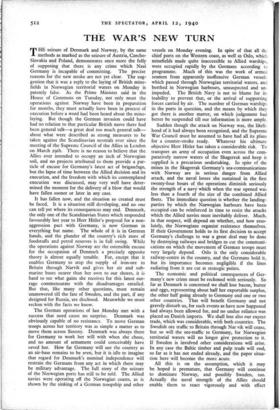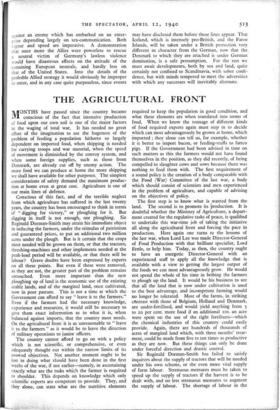THE WAR'S NEW TURN
Fr HE seizure of Denmark and Norway, by the same methods as marked as the seizure of Austria, Czecho- Slovakia and Poland, demonstrates once more the folly of supposing that there is any crime which Nazi Germany is incapable of committing. The precise reasons for the new stroke are not yet clear. The sug- gestion that it was a reply to the laying of British mine- fields in Norwegian territorial waters on Monday is patently false. As the Prime Minister said in the House of Commons on Tuesday, not only must the operations against Norway have been in preparation for months, they must actually have been in process of execution before a word had been heard about the mine- laying. But though the German invasion could have had no relation to that particular British move there had been general talk—a great deal too much general talk— about what were described as strong measures to be taken against the Scandinavian neutrals ever since the meeting of the Supreme Council of the Allies in London on March 29th. There is no reason to believe that the Allies ever intended to occupy an inch of Norwegian soil, and no projects attributed to them provide a par- ticle of excuse for Germany's latest act of brigandage, but the lapse of time between the Allied decision and its execution, and the freedom with which its contemplated execution was discussed, may very well have deter- mined the moment for the delivery of a blow that would have fallen sooner or later in any case.
It has fallen now, and the situation so created must be faced. It is a situation still developing, and no one can tell yet where its consequences may end. Denmark, the only one of the Scandinavian States which responded favourably last year to Herr Hitler's proposal for a non- aggression pact with Germany, is now German in everything but name. The whole of it is in German hands, and the plunder of the country's rich store of foodstuffs and petrol reserves is in full swing. While the operations against Norway are the ostensible excuse for the occupation of Denmark a precisely opposite theory is almost equally tenable. For, except that it enables Germany to stop the supply of iron-ore to Britain through Narvik and gives her air and sub- marine bases nearer than her own to our shores, it is hard to see what gains she receives for this latest out- rage commensurate with the disadvantages entailed. But that, like many other questions, must remain unanswered till the fate of Sweden, and the part, if any designed for Russia, are disclosed. Meanwhile we must reckon with the facts we know.
The German operations of last Monday met with a success that need cause no surprise. Denmark was obviously capable of no resistance. To move German troops across her territory was as simple a matter as to move them across Saxony. Denmark was always there for Germany to work her will with when she chose, and no amount of armament could conceivably have saved her. How far Germany will use the country as an air-base remains to be seen, but it is idle to imagine that regard for Denmark's nominal independence will restrain the Germans from any act in which there may be military advantage. The full story of the seizure of the Norwegian ports has still to be told. The Allied navies were operating off the Norwegian coasts, as is shown by the sinking of a German troopship and other vessels on Monday evening. In spite of that all th,_ chief ports on the Western coast, as well as Oslo, which minefields made quite inaccessible to Allied warships, were occupied rapidly by the Germans according to programme. Much of this was the work of armed seamen from apparently inoffensive German vessels which passed through Norwegian territorial waters, and berthed in Norwegian harbours, unsuspected and un- impeded. The British Navy is not to blame for its inability to prevent that, or the arrival of supporting forces carried by air. The number of German warships in the ports in question, and the means by which they got there is another matter, on which judgement had better be suspended till our information is more ample.
Sudden though the attack on Norway was, the likeli- hood of it had always been recognised, and the Supreme War Council must be assumed to have had all its plans for a counter-stroke ready. Whatever his ultimate objective Herr Hitler has taken a considerable risk. To transport an army of occupation even across the com- paratively narrow waters of the Skagerrak and keep it supplied is a precarious undertaking. In spite of the mines in the Skagerrak Germany's sea-communications with Norway are in serious danger from Allied attack, and the naval losses she sustained in the first twenty-four hours of the operations diminish seriously the strength of a navy which when the war opened was less than a fourth of the size of the combined Allied fleets. The immediate question is whether the landing- parties by which the Norwegian harbours have been occupied can be reinforced in time to resist the attacks which the Allied navies must inevitably deliver. Much, in that respect, will depend on whether, and how reso- lutely, the Norwegians organise resistance themselves. If their Government holds to its first decision to accept Germany's challenge to war a great deal may be done by destroying railways and bridges to cut the communi- cations on which the movement of German troops must very largely depend. Oslo is the only considerable railway-centre in the country, and the Germans hold it, but its importance becomes negligible if the lines radiating from it are cut at strategic points.
The economic and political consequences of Ger- many's new crime must be reckoned with seriously. So far as Denmark is concerned we shall lose bacon, butter and eggs, representing about half her exportable surplus, the other half going already to Germany and one or two other countries. That will benefit Germany and not gravely disturb us, for such events as have now happened had always been allowed for, and no undue reliance was placed on Danish imports. We shall lose also our export trade, which was considerable, with both countries. The Swedish ore traffic to Britain through Nar vik will cease, but so will the ore-traffic to Germany, for Norwegian territorial waters will no longer give protection to it. If Sweden is involved other considerations will arise. In any case the Baltic timber and pulp trade will end, so far as it has not ended already, and the paper situa- tion here will become the more acute.
All this is on the assumption, which it may be hoped is premature, that Germany will continue to dominate Norway, and possibly Sweden, too. Actually the naval strength of the Allies should enable them to react vigorously and with effect against an enemy v:hich has embarked on an enter- prise depending largely on sea-communication. Both vigour and speed are imperative. A demonstration that once more the Allies were powerless to rescue a neutral victim of Germany's lawless violence would have disastrous effects on the attitude of the remaining European neutrals, and hardly less on that of the United States. Into the details of the probable Allied strategy it would obviously be improper to enter, and in any case quite purposeless, since events may have disclosed them before these lines appear. That Iceland, which is intensely pro-British, and the Faroe Islands, will be taken under a British protection very different in character from the German, now that the Denmark to which they are attached is under German domination, is a safe presumption. For the rest we must await developments, both by sea and land, quite certainly not confined to Scandinavia, with sober confi- dence, but with minds tempered to meet the adversities with which any successes will inevitably alternate.



































 Previous page
Previous page